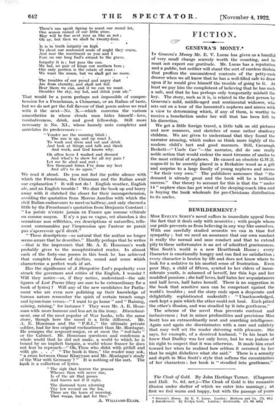BEWILDERMENT.?
Miss EVELYN Scorr's novel suffers in immediate appeal from the fact that it deals only with neurotics ; with people whom our pride prevents us from believing in any way like ourselves. With one carefully studied neurotic we can in time feel sympathy ; but we need an assurance that our own conduct is really the normal and sane conduct and that to extend 'pity to these unfortunates is an act of admitted graciousness. Miss Scott's world is a new Heartbreak House ; every lharacter is emotionally hungry and can find no satisfaction ; every character is beaten by life and does not know where to look kir a sedative to his morbid sense of frustration. Even poor May, a child of fifteen, symbol to her elders of incon- siderate youth, is ashamed of herself, her thin legs and her muddled passions ; she half loves, half hates her acquaintances and half loves, half hates herself. There is no suggestion in the book that sensitive men can be competent against the world's troubles ; and the story ends upon a desperate and delightfully sophisticated makeshift : " Unacknowledged, each kept a pain which the other could not heal. Each pitied the other's illusion, and was steadied by it into gentleness."
The scheme of the novel thus prevents contrast and inclusiveness ; but in minor profundities and precisions Miss Scott has an extraordinarily neat and searching intelligence. Again and again she discriminates with a care and subtlety that may well set the reader shivering with pleasure. She says, for example, of a deceived husband, " In his heart he knew that Dudley was her only lover, but he was jealous of his right to suspect that it was otherwise. It made him cruel toward her when he realized how seldom it occurred to her that he might disbelieve what she said." There is a serenity and depth in Miss Scott's style that softens the eccentricities of her characters : her book is " steadied into gentleness."






































 Previous page
Previous page